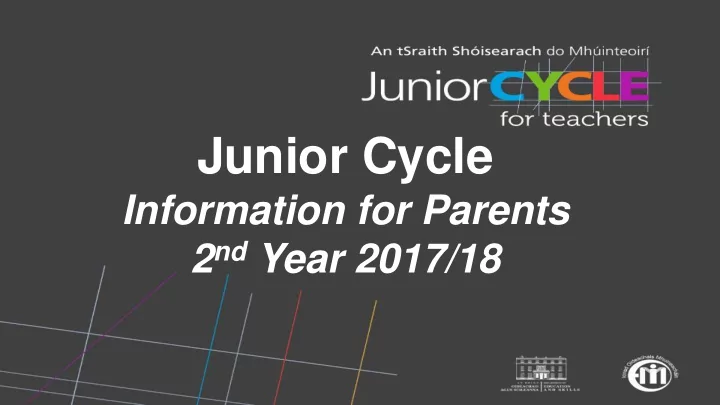

Junior Cycle Click Title Information for Parents 2 nd Year 2017/18
What is the purpose of education in Junior Cycle? • Help students become better learners and develop a love of learning • Provide a solid foundation for further study • To develop skills for learning and life • To support learning through improved reporting to both students and parents
Structure of the Junior Cycle Assessment and Reporting Short Other Areas Subjects Wellbeing Courses of Learning C U 8 Key Skills R R I C U 24 Statements of Learning L U M 8 Principles
September 2016 Furthermore: English ◆ Other Areas of Science Learning will also be Business Studies reported on.
Spirituality Ethics 24 Statements of Learning Guidance and Co-curricular Counselling activities Other Areas of Learning Pastoral Care Visiting Speakers Debating Citizenship Key Skills Student Council Sports
What stays the same? • Students experience a broad and balanced curriculum • Standards and expectations remain high • Subjects continue to play an important role in the Junior Cycle • The Department of Education and Skills will monitor quality across all schools • The State Examinations Commission will continue to be involved in assessment for certification
What is improving? • A more engaging learning experience for your child • Updated subject specifications • Reporting back to parents and students • Assessment to support learning • An emphasis on Key Skills and preparation for life • A sound preparation for learning at Senior Cycle and beyond
Your child will be involved in • Reviewing feedback and identifying what they have done well • Identifying what to do next • Setting and achieving personal goals • Redrafting and correcting their own work • Giving feedback to others • Considering examples of good work and identifying how they can improve on their own work
Assessment Task
One Subject’s Journey 3 1 2 Check Check Check Transition In In In from First Year Second Year 2 nd Year Third Year 3rd Year Primary Classroom- Final Classroom- School Based Assessment Ongoing Based Ongoing Assessment Assessment Assessment Assessment Ongoing assessment that supports student learning
Assessment : Subjects Exams will be set, held and marked by the State Examinations Commission in June of third year. • English specified at Higher and Ordinary level • Science & Business Studies specified at a Common Level • Duration of 2 hours or less
Classroom-Based Assessment Classroom-Based Assessments will provide students with opportunities to demonstrate their understanding and skills in a way which would not be possible in a formal examination. The tasks will cover a broad range of activities including oral presentations, written work of different types, practical or designing and making activities, artistic performances, scientific experiments, projects or other suitable tasks. A particular purpose of the Classroom- Based Assessments will be to facilitate developmental feedback to students. Framework for Junior Cycle 2015, p. 37
How do Classroom-Based Assessments take place? • Details of the Classroom-Based Assessment are set out in Assessment Guidelines of each Subject and Short Course • Teachers will choose Classroom-Based Assessment tasks as per the subject / short course Assessment Guidelines • The NCCA will provide guidance on assessing these Classroom-Based Assessments • Features of quality are described for each Classroom- Based Assessment
CBA KEY DATES English - Period for work on and completion of Oral • Communication: Friday 27th April to Friday 18th May 2018 Business Studies - Period for work on and completing • Business in Action: Monday 12th March to Friday 20th April 2018 Science - Period for work on and completing the Extended • Experimental Investigation: Friday 20th April to Friday 18th May 2018
Ensuring Quality • Schools will organise “Subject Learning and Assessment Review” meetings • Teachers will compare their assessment of students’ work and ensure a common approach across the school • CPD will be provided for teachers to ensure that the Classroom-Based Assessments align to a national standard
Assessment Task ◆ The written Assessment Task is marked by the State Examinations Commission ◆ It may require the student to demonstrate an understanding of the knowledge and skills developed during the second Classroom-Based Assessment. ◆ The written Assessment Task may also provide an opportunity for students to refer to skills and competences that were developed and describe ways in which their learning might be applied to new situations. ◆ The Assessment Task will be completed in class under the supervision of the teacher and will be sent to the SEC for marking along with the script for that subject in the state-certified examination. Framework for Junior Cycle 2015, p. 38
Classroom-Based State Examinations Assessments • Exceptional • Above expectations • In line with expectations • Yet to meet expectations • Not reported
The Junior Cycle Profile of Achievement will report on • SEC examinations of subjects • Classroom-Based Assessments • Other Areas of Learning
Recommend
More recommend